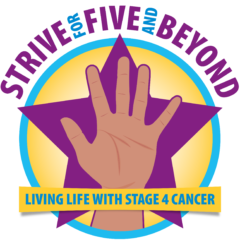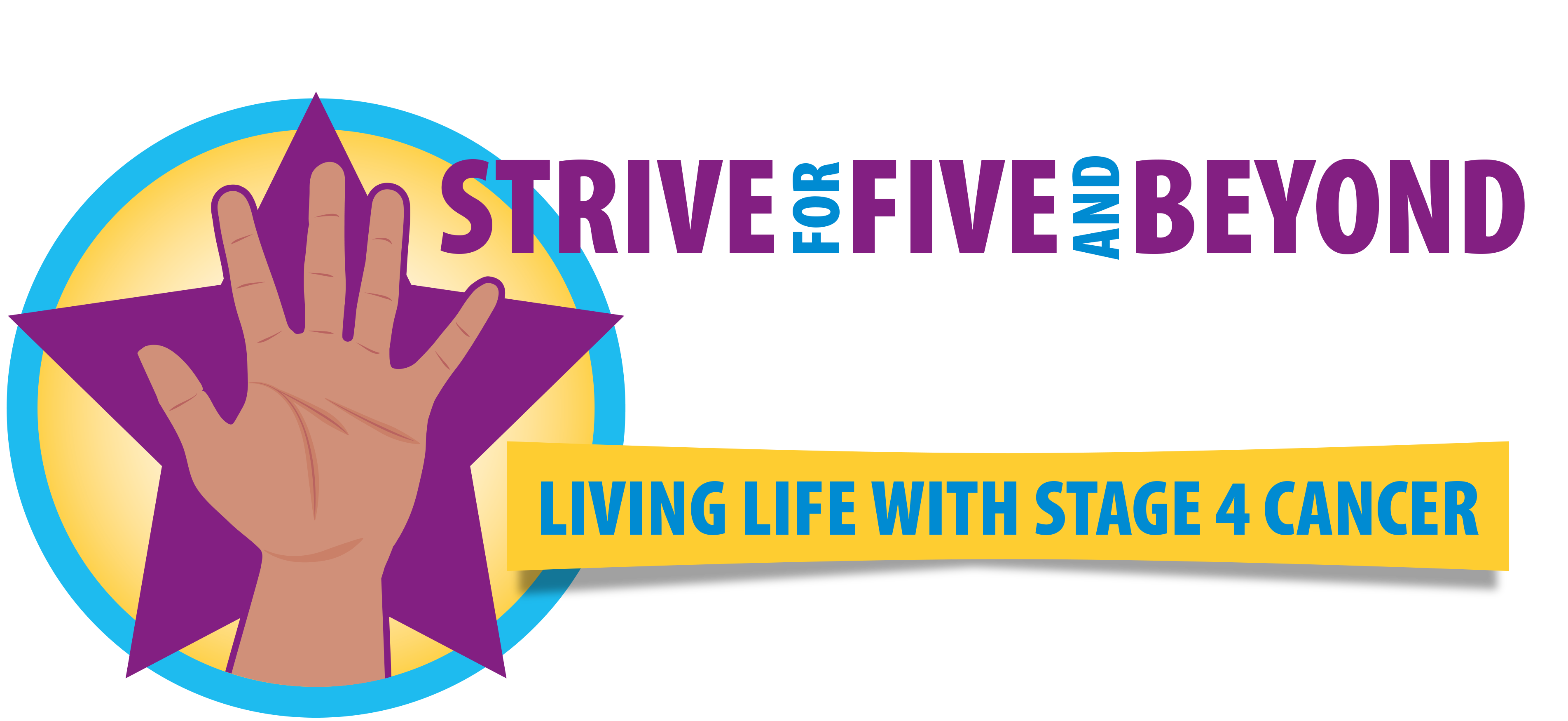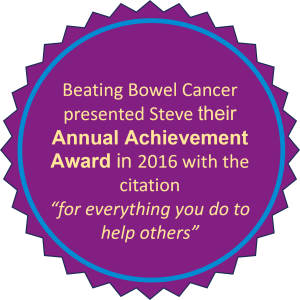
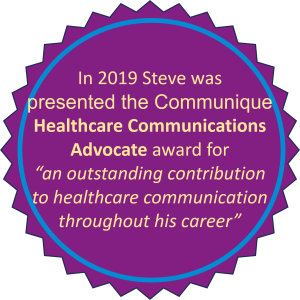
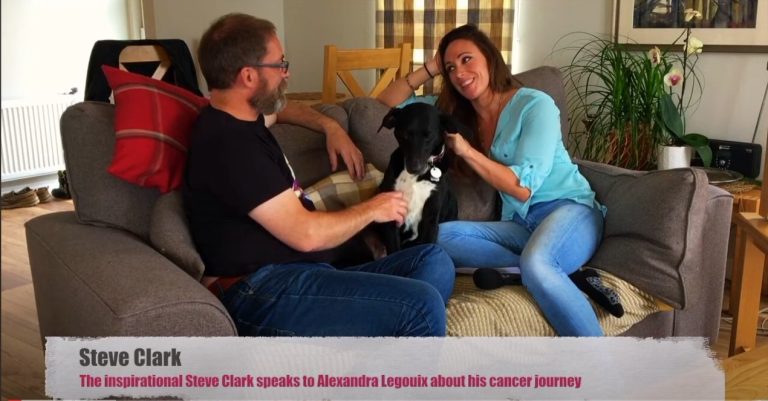
In May this year, Steve told his story via Zoom to a group of cancer patients at the Cancer Support Network: Cancer Champions. In this video you can hear Steve’s journey through diagnosis and treatment, how he learned to cope with the diagnosis and to ask for help from friends, and the tips he’s learned over the years.
There was a bit of a stumble at the start while we sorted the technical stuff out but then everything was fine. You’ll need the passcode to access the video L3pD5cy$
Alexandra Leguoix interviewed Steve as he approached the five year mark, about how he coped with his diagnosis and prognosis, living a full a life with advanced bowel cancer and what he’s achieved. These videos are still current and we hope you find them uplifting. Please feel free to share them if you think they’ll help people with stage 4 cancer.
There are 5 videos from the chat between Alex and Steve, these are available on our YouTube channel and on the links below:
In 2017 Steve was invited to give a presentation on how to improve the management of people with advanced colorectal cancer. This was for an audience of oncologists and colorectal surgeons at the Royal College of Surgeons in London. This video is a 2019 update recorded for a university training course:
In September last year Steve was part of an international expert panel at the European Society of Medical Oncology in Paris. The meeting was titled CLOSING THE GAPS IN PATIENT CENTRICITY. This was Steve’s first outing since the COVID lockdown so was a challenge, but definitely rewarding. The discussion was wide ranging and highlighted the need for patient’s to have a say in their care and that there needs to be more training for oncologists to help them improve how they communicate with their patients.
You can find all the videos on our YouTube channel HERE.
Steve has been featured on two sets of podcasts as a guest.
THE MINDSET UNFILTERED podcast chatted with Steve about his story and how a positive approach has helped through his cancer, from diagnosis to smashing the expected survival. Steve’s story formed three episodes:
The BBC’s GEORGE ALAGIAH “IN CONVERSATION WITH” podcast discussed chemotherapy with Steve and Professor Mark Saunders (Christie Hospital, Manchester).
As part of the international podcast series “Patients On The Move”, Steve was in conversation with Roger Legtenberg. Join this impactful conversation to delve into the importance of positive focus in treatment discussions & the role that #patientengagement can play.
Bowel Research UK has an excellent series focussing on patients, called CAN I BUTT IN. In this episode, Sam interviews Steve about the importance of SETTING PATIENTS UP FOR SUCCESS and the importance of knowing about THE NOCEBO EFFECT.
ACCEPT YOUR DIAGNOSIS
Accepting your diagnosis is actually one of the most significant steps, it allows you to move forward and focus on getting the most from your treatment.
Try and get the balance right. Don’t kid yourself about this disease, you are ill, but don’t let it grind you down, you can aim to live a very full, active and fun life.
Talk it through with friends and family. Invite and welcome help and support. You really can’t do it alone and they will need to do things to help you – own it. You may need to tell people how to speak to you as some get very confused around cancer and just want to protect you. Talking to others about cancer can help you come to terms with it.
TAKE IT ONE STEP AT A TIME
In the early days and months it can feel daunting to look at an uncertain future, I found it better to take it in bite sized chunks – focusing my energy on the next couple of things that are going to happen like getting ready for surgery or chemo etc.
TALK ABOUT IT
I know that dealing with cancer can feel like a lonely experience, but it doesn’t have to be like that.Very early after my diagnosis I realised that my friends and family really wanted to help and support, but they needed to know what I needed – that was up to me. I had to learn how to ask for help and to welcome support, not easy for such an independent person but absolutely essential.
The big tip here is don’t be afraid to ask for help and to tell people what you need.
It’s also important to let people know how to talk with you as many won’t know what to say, or may be nervous about upsetting you. If you don’t feel you can talk to friends then find a safe online forum like the one at Bowel Cancer UK where you can get support from other patients and relatives.
TRY NOT TO LET CANCER DEFINE YOUR LIFE
I view it as an obstacle I’m overcoming. Don’t get too hung up on why you have cancer or what caused it, in many cases that’ll never be known for sure and there’s little to be gained from it. Try to use that energy on positive things that you can influence like being able to go on holiday.
IT’S NOT A “BIG C” ANYMORE!
Finding your perspective on things can make a huge difference
For example, I’ve never liked calling cancer “the big C”, I feel it gives it too much power, I prefer to see it with a very small “c”
I’m going to start saying Chemo is my big C – it’s my friend and it’s got my back, it’s given me a bonus 10 years since stage 4 diagnosis and squashed the little c!!
DON’T TRUST DR. GOOGLE
There’s a lot of great information out there on the internet for cancer but beware the snake oil peddlers and scaremongers!
Limit your main information sources to reputable sites from major scientific groups and charities. Believe me, it’ll help avoid unnecessary stress!
TRUST YOUR MEDICAL TEAM, THEY’RE THERE FOR YOU
Your team are dedicated professionals with your best interests at heart. When you’re in hospital try to follow their advice as closely as you can, they know what they’re doing.
That said, don’t be afraid to challenge them and ask questions if you don’t understand what they’re doing or don’t agree with them. And if needed please don’t be afraid to ask for a referral elsewhere for a second opinion.
ACCEPT YOUR TREATMENT
Granted your treatment (probably chemo and/or radiotherapy) may make you feel ill, but it’s doing great things to help you. So, try to welcome your treatment as a friend and ally in your quest to get on top of cancer.
SEE ‘PROGNOSIS’ AS A TARGET TO BEAT!
If your doctor tells you your prognosis, bear in mind it’s not an exact science, it’s a highly educated guess. Your doctors will be so happy when you beat that prognosis estimate and prove them wrong!
I try to view each prognosis estimate as another target to beat.
TAKE YOUR TREATMENT
COPING WITH ‘SCANXIETY’
An almost universal stress point on the cancer journey are the follow-up scans. Lots of us get worried about what the results will show, it’s completely understandable!
The way I cope is by saying “there’s no such thing as a bad result”. If the scan is clear then happy days. If it shows a recurrence that’s good news too – it means whatever’s there can be dealt with, and the sooner the better!
KEEP A CHEMO DIARY
During your chemo it’s a good idea to keep a record of how you feel each day.This will allow you to let your medical team know how you’re doing so they can tweak your treatment or adjust the support meds they give you. It can also help you predict how you’ll feel during your next cycles so you can plan around it.
I used to have a couple of ‘low’ days so I made sure I wasn’t traveling or doing anything energetic on those days, that made the rest of the cycle much easier.
WELCOME YOUR CHEMO
Facing something like chemo can be daunting, especially with so many scary stories going around.
I struggled with my first round of treatment but found it better when I pictured it as MY chemo that was there to help me.
Seeing chemo as my friend and ally made the treatments a far better experience and my medical team think it led to better results too!
Picture your chemo in a way that works for you – it may be a friend to lean on, and army fighting for you, or your own superhero!
This is particularly important as most of the good effects of chemo are “quiet”, after all we can rarely feel a tumour shrinking. But the side effects of chemo can be quite “loud”.
Always remember that YOUR chemo is there to help YOU!
DON’T FEAR A DOSE DROP
When we’re on chemo, we want it to be as effective as possible. Many of us try hide the side effects from the nurses just so they don’t reduce the dose. I was like that. I was worried that a dose reduction would make my chemo less effective.
What I didn’t realise is that oncology is different to most areas of medicine – with chemo they generally start at the MAXIMUM DOSE and REDUCE IT to a level that’s TOLERABLE for the patient. I wish I’d realised that at the start!
So it’s really important that you tell your doctors and nurses about any side effects you get on your chemo, then they can tailor the dosage to suit YOU. That way you can really get the most from your chemo!
APPROACH SECOND- AND THIRD-LINE CHEMO THE SAME AS FIRST-LINE
I often hear people of moving onto their second or third line chemo, but being told there’s a “low chance of success”. I can understand why the doctor thinks this but it’s entirely the wrong approach and mindset to these treatments.
As we go through the lines of treatment the reported efficacy decreases, that’s true of almost all medicines, but they do still have positive effects in many patients – that should be the focus!
What’s key is that the figures are on overall data, they aren’t about YOU, so no one knows how great the treatment will be for you.
Therefore, try to approach second and third line chemo (and clinical trials) as you did for your first treatment – with a sense of cautious optimism and a determination to get all you can from it!
DON’T WORRY IF YOU CAN’T BE “CURED”
There’s a lot of focus on curing cancer but if you have advanced (stage 4) bowel cancer that can be difficult.
You may then get an ‘incurable’ label which I don’t think helps anyone! After all, there are very few diseases that can be cured, just think about things like diabetes and high blood pressure.
More and more of us are living longer, active lives despite being ‘incurable’.
I’ve been on a maintenance regimen for over 9 years now and I’ve found it manageable, it allows me to lead a fun and active life while doing something positive to control the disease, like they do with diabetes etc!
DON’T GET HUNG UP ON SURVIVAL RATES!
We all tend to look for the survival stats for our diagnosis, and for stage 4 cancer these can look pretty bleak, but they don’t tell the story that’s relevant for us as individuals.
It’s important to recognise what the official stats actually are – they’re old data from several years ago looking backwards at historic trends. They don’t reflect the latest advances in care and they include everyone ever diagnosed, regardless of how well they were at diagnosis, they’re not about YOU
SURVIVAL STATS DON’T PREDICT HOW LONG YOU WILL LIVE FOR.
They are very helpful in some ways – for comparing survival between countries and even between hospitals. They also show overall trends trends over time (which are continually improving).
I saw the stats as a target to exceed rather than a definite number. And I’ve continued to exceed it!
FOCUS ON THINGS YOU CAN INFLUENCE
Break it all down into bit-sized chunks, especially in the early days.
For me there were so many factors that could change early on that it was impossible to get my head around 5 years, or even just the first year. I found it easier to break it down into things I could influence, like getting ready for my op, recovering from the op steadily, building my strength up for chemo etc. That way I could stay sane.
MINDSET IS SO IMPORTANT
I’ve been positive all the way through this and I do believe it’s made a massive difference. In fact my chemo nurse said she thought my great results from the intense chemo was 50% the drugs and 50% my attitude!
Use your diagnosis as a positive – as a stimulus to really live your life.
BE KIND TO YOURSELF
At times I get frustrated at myself, usually because if something I can’t do, or I’ve done something stupid (like snagging my 5FU line, ouch!)
A very good friend saw me do this and said “be kind to yourself”.
It was such good advice and it stuck with me – sometimes we need to give ourselves a break when we’re going through advanced cancer!
RECOGNISE THE GOOD STUFF
None of us want to have cancer, I certainly wish I didn’t have it.That said, I’m recognising the good things that have come from it!
I’ve now got better and closer relationships with my friends and family. My outlook is so much more balanced and my life is far more fulfilling.
I wish I didn’t have cancer, but I love so much of my new life.
HAVE FUN
It’s easy to lose ourselves in this whole cancer thing, but it’s so important to do things that make us smile and laugh! This can be a great tonic in itself.
It doesn’t have to be anything wild or overly energetic (unless you feel up to that of course), but having a laugh with friends and family is so important!
STRIVE!
When I was diagnosed the outlook seemed bleak, the stats and my doc’s prognosis were not good, so I decided I needed something to aim for. Cancer studies look at “5-year survival” so that’s what I wanted – to live BEYOND 5-years with stage 4 bowel cancer.
5-years was my stretch target, something there on the distant horizon that I wanted to achieve and exceed. It wasn’t a fixation though, my main focus has always been the next steps on the way to getting there!
Now I’m past the 10-year survival mark!
STRIVE FOR FIVE has become a campaign aiming to give hope to others with Stage 4 cancer.
